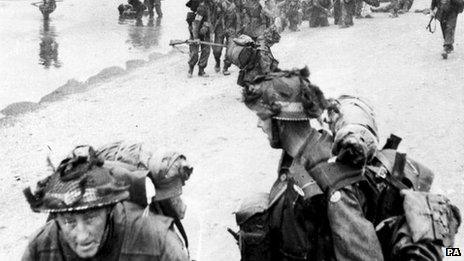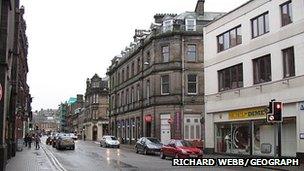Unsuccessful bid for funds to restore Inverness building
- Published

Work done by welders in Inverness helped to supply Allied forces that landed in France in 1944
An effort to secure funding to restore a building where key military equipment was made during World War II has failed.
The former AI Welders factory in Academy Street, Inverness, manufactured components for Spitfire aircraft.
Workers also welded parts for subsea pipelines used to deliver fuel from England to France for Allied tanks and transport after D-Day in 1944.
Highland Council has been unsuccessful in getting Heritage Lottery funds.
The local authority could make a fresh application to the Heritage Lottery Fund and also hopes to work with Historic Scotland.
There have been concerns that the former AI Welders premises and others buildings in Academy Street have become dilapidated and need repairs.
From 1939 until the end of the war, AI Welders' welding machines and operators were crucial to Britain's war effort.

The former factory is in Inverness's Academy Street
Hubs into which aircraft propeller blades were fitted were welded at the foundry.
Workers also made parts for the Pipe Line Under The Sea, also known as Operation Pluto.
The operation involved laying pipelines in the English Channel to supply fuel from pumping stations on mainland England and the Isle of Wight to stores on France.
Delivering fuel by ship was deemed too risky. Allied commanders feared the vessels would be sunk by German submarines and aircraft.
There were also concerns the ships would get in the way of other Allied shipping.
Many of the pumping stations were disguised in an effort to prevent the sites being attacked. One station was built to look like an ice cream shop and another as a fisherman's cottage.
- Published6 June 2012